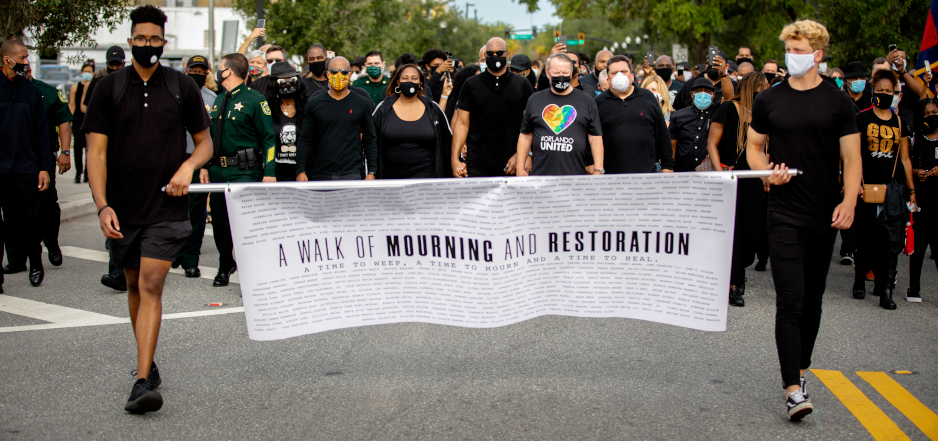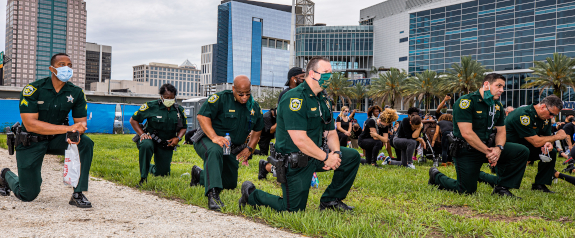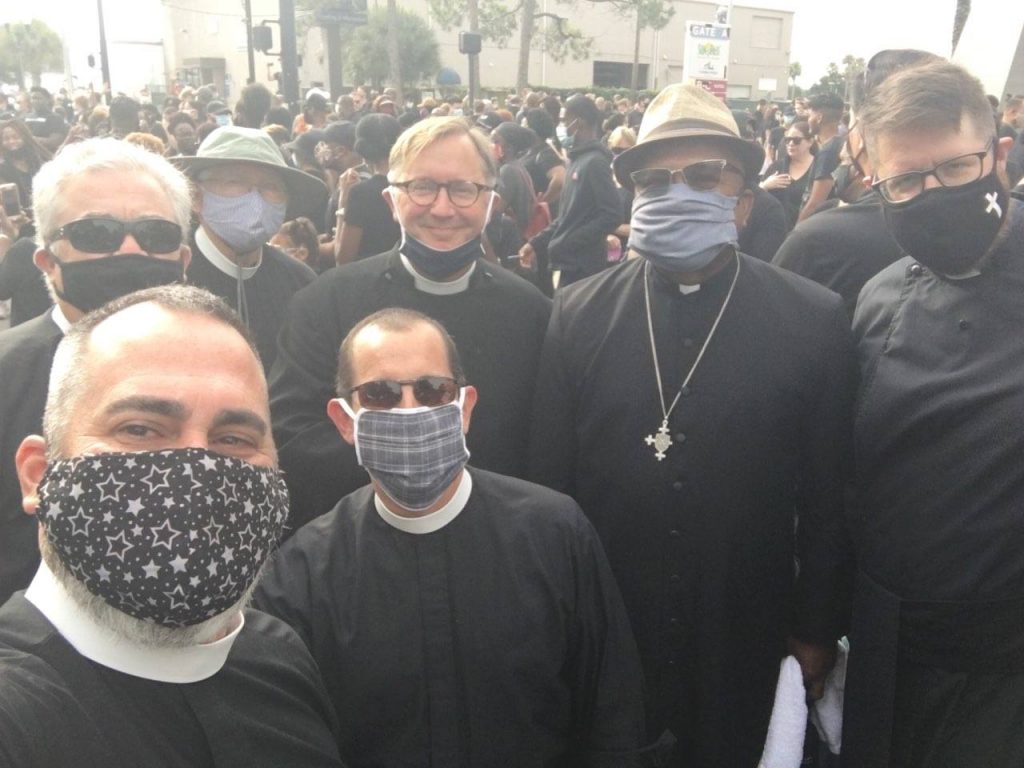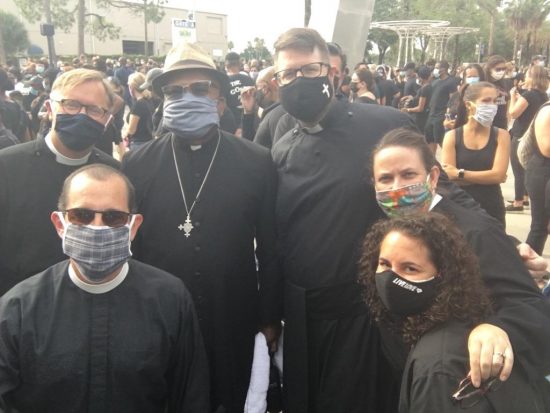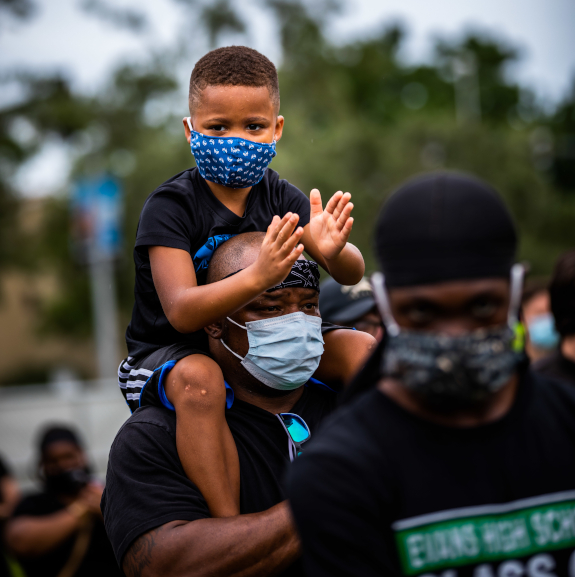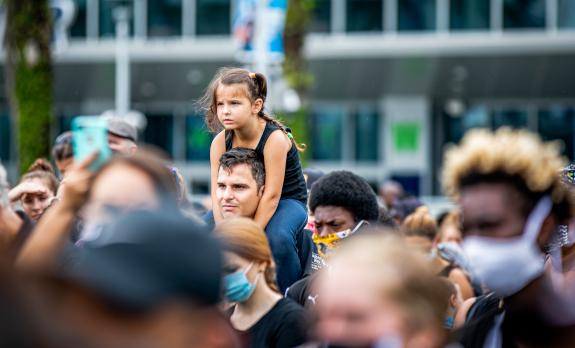On Friday, June 5, a city-wide “Walk of Mourning and Restoration” was held to decry racism and work toward unity, with many Episcopal ministers participating, including The Rt. Rev. Greg Brewer, bishop of the Diocese of Central Florida.
The walk, which tied into larger protests and vigils around the country in response to the death of George Floyd, was organized by Pastor Tim Johnson of Orlando World Outreach Center in partnership with Orlando City Commissioner Regina Hill, Pastor Derrick McRae of Experience Christian Center, Roderick Zak, president of African American Council of Christian Clergy (AACCC). It began at Camping World Stadium and proceeded down Church Street to Division Avenue, where a service was held to mourn, repent and pray for restoration.
According to Johnson, the tone set for the walk was decidedly nonpolitical. “This is not a march. This is not a demonstration. This is not a protest. This is a walk to mourn those who have been the victims of injustice in our nation,” he said. “We must mourn together to heal together.”
Brewer, who reported there were more than 600 gathered, including local leaders and clergy, echoed the sentiment. “This was not in any way a political protest,” he said. “It was a walk to pray and [say], ‘If we’re a part of the problem, that means we need God to fix it, because we can’t.’”
He also noted the significance of the vigil site, where Church Street meets Division Avenue, a point that historically separated white neighborhoods from black neighborhoods.
“The name was Division Street, and there was a reason it was called that,” Brewer said. “So it was a way of saying, ‘We’re here at one of the marks in the history of racism here in Orlando,’ which was poignant.”
Brewer invited additional Episcopalian clergy to participate, with many expressing gratitude for the organizers and community that came together.
“It was hard and humbling to walk beside our black and brown brothers and sisters who are grieving so much right now,” said The Rev. Canon Josh Bales, Cathedral Church of Saint Luke, Orlando. “It was hopeful to hear and see, publicly, a group of white pastors apologize to a group of black pastors. It was overwhelming to hear and see the black pastors respond with embraces of forgiveness. It was a morning so filled with Christian unity and hope that, for just a second, I got a glimpse of the future: ‘Thy kingdom come, Lord. Thy will be done.’”
The Rev. Jim Sorvillo of Church of the Ascension, Orlando, felt an urgency to support a vital cause.
“With all the violence that has been taking place during certain protests, we felt it was important to be part of a faith-community response in Orlando,” he said. “It was wonderful to be able to be side by side with people from varied faith communities to pray and show Orlando that we can come together during these times, despite any personal or political differences. I loved that we could see in practice what we read in Galatians 3:28, ‘There is no longer Jew or Greek, there is no longer slave or free, there is no longer male and female; for all of you are one in Christ Jesus.’”
The walk of restoration also carried personal significance for The Rev. Sara Oxley, assistant rector of Church of the Ascension, who had experienced grief in the days following Floyd’s murder.
“After months of trying to navigate COVID-19, the new developments around the country left me feeling very sad and overwhelmed,” she said. “The bishop’s invitation to join in the walk was a welcome response to act.”
Like Brewer, Oxley said prayer was key to fighting for equality and against racism. “The walk was important because it joined Orlando faith communities under Christ to pray and seek the Lord’s help with racism,” she said. “This can only be healed through prayer.”
The Rev. Canon Scott Holcombe, canon to the ordinary, who was raised by parents intent on helping him see beyond color, pointed out the families represented at the walk, which he saw as a needed step. “An unexpected blessing was watching and listening to the parents around me using this as an opportunity to teach their children why we were doing this,” he said. “I especially appreciated the reading of the names, scriptures and prayers across traditions.”
Going forward, Brewer said, the walk can be a starting point for more intentional work. “There really are legislative structural challenges if we’re going to fix systemic racism in our community,” he said. “But to say that this is a group of people who are going to find a way to do it together and ask God to help us do it, I think it was really important. I think that’s a part of the nature of one’s Christian witness.”
Photos by Shawn Rinehart

